Trending Now
If you think that libraries are just for housing and protecting important books and papers, think again. There’s the global seed library in Svalbard (consider how you’re going to get there in the apocalypse), the Ice Memory collection in Antarctica, and now, the Puratos World Heritage Sourdough Library in St. Vith, Belgium.
The world’s only sourdough museum was created to safeguard more than 100 bubbling bread starters (a worthy cause, in this carb-obsessed woman’s mind).
https://www.instagram.com/p/B00xcbnJnq4/
If you’ve ever had occasion to bake sourdough bread at home, then you understand that the “starters” are basically a pet that will never, ever stop growing as long as you feed it and keep it in optimal conditions. My grandmother had one that kept growing and growing and growing until all her neighbors started to hide when they saw her coming, trying to pawn off some of the pieces into their fridges.
Historically speaking, sourdough is important – it may have been the world’s original leavened loaf. Before the advent of commercial yeast, people and bakers relied on wild yeasts and bacteria that fermented and grew over a period of days to leaven their bread. Like my grandmother, people shared pieces of their leavening with family and friends, making the food unique, but also local history.
https://www.instagram.com/p/B0irUlVHrUQ/
Puratos, a Belgian bakery supply company, has been collecting starters since 1989, and they opened the Sourdough Library in 2013. It currently houses 108 starters from countries around the world, including Italy, China, Hungary, Greece, and Canada, and is overseen by Karl De Smedt. The “sourdough librarian” travels the world in search of new and exciting samples.
He also makes sure the samples are fed and cared for, including periodically providing flour from the original donors.
The samples he sends back are analyzed and then their unique microorganism combinations are documented – they’ve catalogued over 800 strains of years and bacteria so far. They preserve the microorganism samples, and keep the starters in glass library jars.
https://www.instagram.com/p/B0n4w-MnGQ7/
Given its need to be cultivated and cared for, sourdough went out of fashion in many ways once commercial yeasts became available. But with a resurgence of interest in the handcrafted and artisan*l – plus the fact that many with gluten sensitivities find it to be more digestible – sourdough is finding new popularity.
The library is available to anyone who damages their own supply, and they host an online database where you can enter (or borrow) recipes.
It is not, however, open for public tours, though De Smedt did tell Atlas Obscura that he would be happy to show visitors around if they contacted him on social media ahead of time.
https://www.instagram.com/p/BzpI4enowD3/
Don’t all make your travel plans at once.
If you don’t have the ways or means to find your way to Belgium, you can always visit the online version of their database, which also includes helpful videos.
I’m half-inspired to start my own loaf and half-terrified it would take over my fridge and Ghostbusters would need to make a house call.
Stay tuned.






